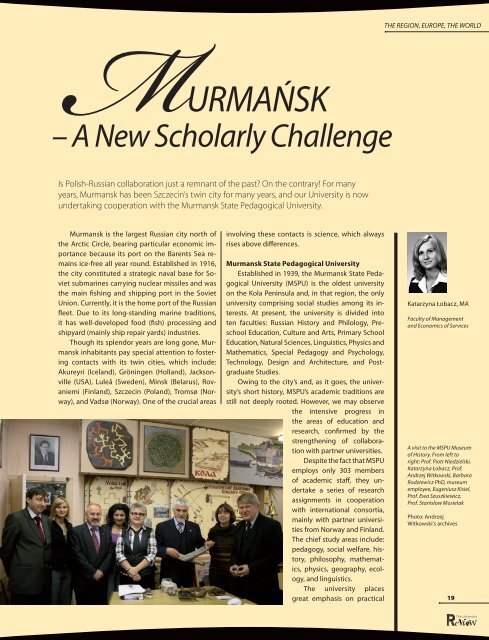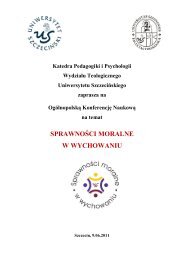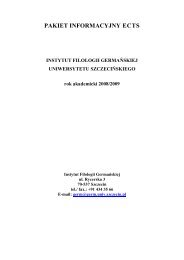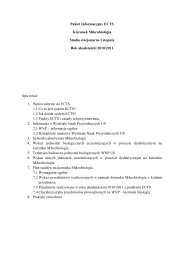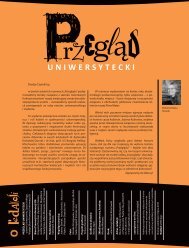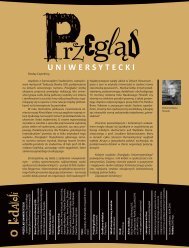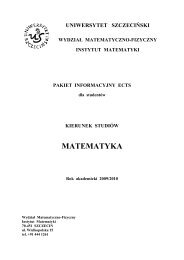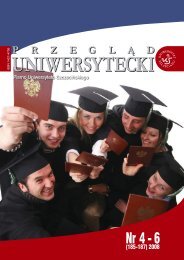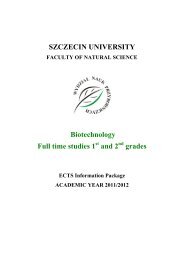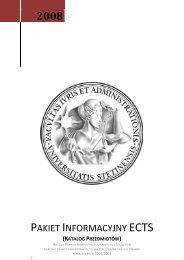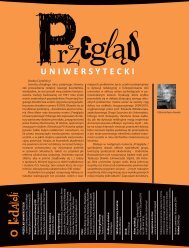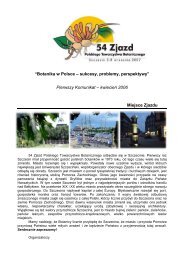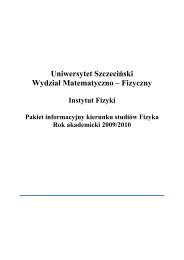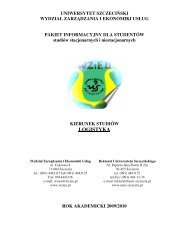The University
The University
The University
Create successful ePaper yourself
Turn your PDF publications into a flip-book with our unique Google optimized e-Paper software.
THE REGION, EUROPE, THE WORLD<br />
MURMAŃSK<br />
– A New Scholarly Challenge<br />
Is Polish-Russian collaboration just a remnant of the past? On the contrary! For many<br />
years, Murmansk has been Szczecin’s twin city for many years, and our <strong>University</strong> is now<br />
undertaking cooperation with the Murmansk State Pedagogical <strong>University</strong>.<br />
Murmansk is the largest Russian city north of<br />
the Arctic Circle, bearing particular economic importance<br />
because its port on the Barents Sea remains<br />
ice-free all year round. Established in 1916,<br />
the city constituted a strategic naval base for Soviet<br />
submarines carrying nuclear missiles and was<br />
the main fishing and shipping port in the Soviet<br />
Union. Currently, it is the home port of the Russian<br />
fleet. Due to its long-standing marine traditions,<br />
it has well-developed food (fish) processing and<br />
shipyard (mainly ship repair yards) industries.<br />
Though its splendor years are long gone, Murmansk<br />
inhabitants pay special attention to fostering<br />
contacts with its twin cities, which include:<br />
Akureyri (Iceland), Gröningen (Holland), Jacksonville<br />
(USA), Luleå (Sweden), Minsk (Belarus), Rovaniemi<br />
(Finland), Szczecin (Poland), Tromsø (Norway),<br />
and Vadsø (Norway). One of the crucial areas<br />
involving these contacts is science, which always<br />
rises above differences.<br />
Murmansk State Pedagogical <strong>University</strong><br />
Established in 1939, the Murmansk State Pedagogical<br />
<strong>University</strong> (MSPU) is the oldest university<br />
on the Kola Peninsula and, in that region, the only<br />
university comprising social studies among its interests.<br />
At present, the university is divided into<br />
ten faculties: Russian History and Philology, Preschool<br />
Education, Culture and Arts, Primary School<br />
Education, Natural Sciences, Linguistics, Physics and<br />
Mathematics, Special Pedagogy and Psychology,<br />
Technology, Design and Architecture, and Postgraduate<br />
Studies.<br />
Owing to the city’s and, as it goes, the university’s<br />
short history, MSPU’s academic traditions are<br />
still not deeply rooted. However, we may observe<br />
the intensive progress in<br />
the areas of education and<br />
research, confirmed by the<br />
strengthening of collaboration<br />
with partner universities.<br />
Despite the fact that MSPU<br />
employs only 303 members<br />
of academic staff, they undertake<br />
a series of research<br />
assignments in cooperation<br />
with international consortia,<br />
mainly with partner universities<br />
from Norway and Finland.<br />
<strong>The</strong> chief study areas include:<br />
pedagogy, social welfare, history,<br />
philosophy, mathematics,<br />
physics, geography, ecology,<br />
and linguistics.<br />
<strong>The</strong> university places<br />
great emphasis on practical<br />
Katarzyna Łobacz, MA<br />
Faculty of Management<br />
and Economics of Services<br />
A visit to the MSPU Museum<br />
of History. From left to<br />
right: Prof. Piotr Niedzielski,<br />
Katarzyna Łobacz, Prof.<br />
Andrzej Witkowski, Barbara<br />
Rodziewicz PhD, museum<br />
employee, Eugeniusz Kisiel,<br />
Prof. Ewa Szuszkiewicz,<br />
Prof. Stanisław Musielak<br />
Photo: Andrzej<br />
Witkowski’s archives<br />
19


